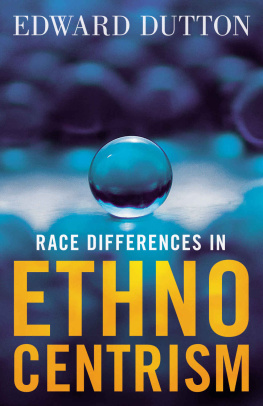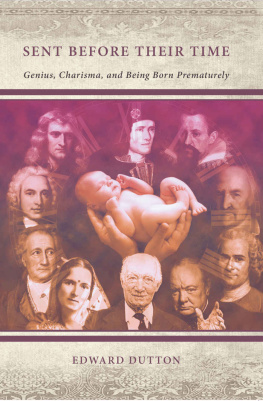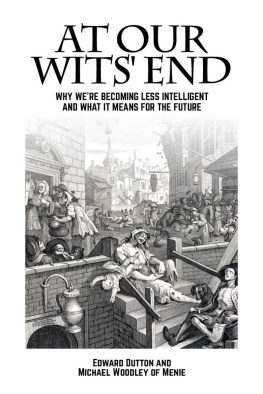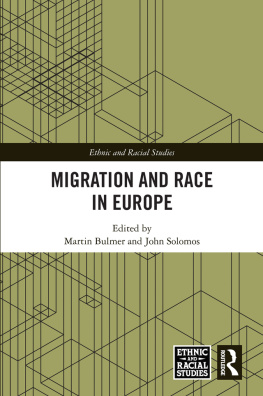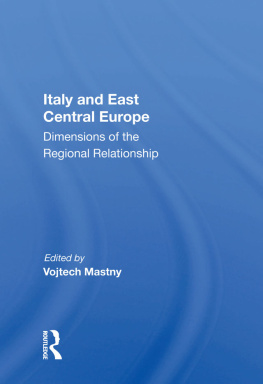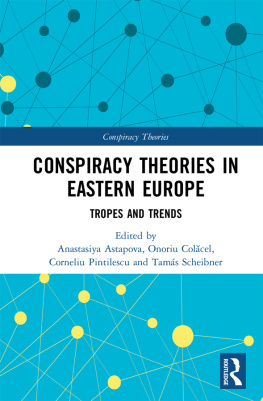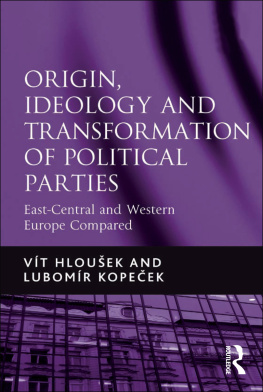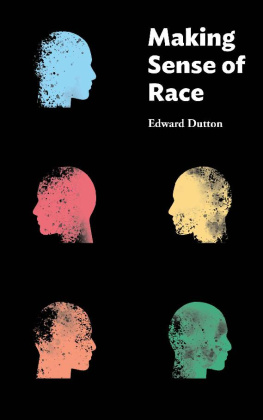
Arktos
London 2019

Copyright 2019 by Arktos Media Ltd.
All rights reserved. No part of this book may be reproduced or utilized in any form or by any means (whether electronic or mechanical), including photocopying, recording or by any information storage and retrieval system, without permission in writing from the publisher.
Arktos.com | Facebook | Twitter | Instagram | Gab.ai
ISBN
978-1-912975-05-1 (Softcover)
978-1-912975-25-9 (Hardback)
978-1-912975-06-8 (Ebook)
Editing
Elliot Tardif
Cover and Layout
Tor Westman
About the Author
Edward Dutton is a freelance researcher and writer. Born in London in 1980, he lives in northern Finland. Dutton was educated at the University of Durham, where he graduated in Theology in 2002, and the University of Aberdeen, from which he received his PhD in Religious Studies in 2006.
Dutton has been guest researcher at Leiden University in the Netherlands, Ume University in Sweden, and has been academic consultant at King Saud University in Saudi Arabia. Duttons other books include: Meeting Jesus at University: Rites of Passage and Student Evangelicals (2008), The Genius Famine (2015, jointly with Bruce Charlton), How to Judge People By What They Look Like (2018) and At Our Wits End: Why Were Becoming Less Intelligent and What It Means for the Future (In Press, 2018; jointly with Michael Woodley of Menie).
Dutton was first to set out all the evidence for IQ decline across Europe, proposed the idea that non-religious people are low in instinct, and proved that traditional religiousness is a reflection of low levels of mutant genes. Duttons research has been reported in newspapers worldwide. In his spare time, Dutton enjoys genealogy and has written widely on the subject. He is married to a Finn and has two young children.
Acknowledgements
I would like to acknowledge the assistance of the following colleagues who have generously forwarded me literature or provided useful critiques of aspects of this book: Dr Boris Bizumic, Dr Bruce Charlton, Dr Curtis Dunkel, Prof. A.J. Figueredo, Herra Aleksi Kari, Herr Emil Kirkegaard, Dr Kenya Kura, Prof. Guy Madison, Prof. Gerhard Meisenberg, Dr Frank Salter, Prof. Dimitri Van der Linden and Dr Michael Woodley of Menie.
Edward Dutton
21st November 2018
Chapter One
At Least They Hear the Things I Hear
1. Introduction
Ethnocentrism, argued the American economist William Sumner (18401910), is the view of things in which ones own group is the centre of everything and all others are scaled and rated with reference to itEach group nourishes its own pride and vanity, boasts itself superior, exalts its own divinities, and looks with contempt on outsiders (Sumner, 1906, p. 13). This kind of attitude is epitomized in words attributed to Socrates: He thanked Fortune for three things, it was said, one of them being, that I am a Greek and not a barbarian (quoted in Coleman, 1997, p. 175). It is also very clear in the way that the British Empire produced maps with Britain at the centre, and longitude continues to be measured in degrees east or west of Greenwich in London (Benson, 2002, p. 37).
Ethnocentrism, then, comes in two forms. On the one hand, positive ethnocentrism involves taking pride in your ethnic group or nation and being prepared to make sacrifices for the good of it. Soldiers who regard their nation as being the best in the world and are prepared to risk their lives to defend it are positively ethnocentric. In England, at the start of World War I, a huge propaganda campaign successfully persuaded thousands of young men to fight for their country, appealing to this kind of ethnocentrism. Recruitment posters included John Bull, the symbol of Britishness, standing in front of uniformed soldiers and asking the reader, Whos absent? Is it you? (see Messinger, 1992).
On the other hand, negative ethnocentrism refers to being prejudiced against and hostile to members of other ethnic groups. The English soldier who is motivated by hatred of the Germans and is prepared to brutalize German civilians because they are German is high in negative ethnocentrism. During World War I, anti-German feeling in England reached such extremes that there were anti-German riots, assaults on suspected Germans, and the looting of stores whose owners had German-sounding surnames (Panayi, 1989). The British Royal Family, who are of German descent, were even forced to change their surname from Saxe-Coburg-Gotha to Windsor due to the anti-German hysteria generated by the War (Baldick & Bate 2006, p. 303).
Ethnocentrism combines these two dimensions. A person is ethnocentric if they take pride in and make sacrifices for their country and are prejudiced against other countries, although, as we will see, there are people and groups who are high in one aspect of ethnocentrism but not in the other. Criticisms might be levelled against this division between positive and negative ethnocentrism. For example, it might be argued that people in many Western European countriesinfluenced by ideologies such as Multiculturalismmay profess a low level of national pride but will, nevertheless, hold to a view in which their own country is at the centre of the world and believe that everywhere should want to be like their own country, in the sense of being Multicultural. so it is, on the surface, inconsistent with ethnocentrism. However, it can be countered that, in this case, the sense of pride is in their countrys ideology and if their country had a different ideology, such as a highly nationalistic one, then the same people would have far less pride in their country. Equally, people who adhere to such an ideology seem to be prejudiced against genuinely ethnocentric countries, such as Israel (Jayanetti, 17th April 2017), precisely because they reject Multiculturalism. National pride means being proud of your country simply because it is your country.
In this book, then, we aim to understand the causes of ethnocentrism and the reasons why there is variation in the degree to which different races and ethnic groups are ethnocentric. Put simply, we want to answer the question: Why are some races more ethnocentric than others? and, indeed, Why are Europeans currently so low in ethnocentrism? As we will see, there has been considerable discussion of the possible reasons for individual variation in levels of ethnocentrism. However, there exists no systematic attempt to understand why different ethnic groups may vary in the extent to which they are ethnocentric. Understanding the reasons for group differences in ethnocentrism is particularly salient during a period of mass migration (see Salter, 2007). Europe, in particular, has been experiencing this since the 1960s and it started to become particularly acute in the summer of 2015, when the mass movement of people from the Middle East into Europe, often via Turkey, was referred to as the Great Migration (e.g. Nelson, 3rd September 2015). As many of the immigrants claimed to be refugees, supposedly fleeing violence in Syria at the hands of ISIS (Islamic State), the European Union instituted a policy whereby each nation should take refugee quotas ( BBC News , 22nd September 2015). The crisis evoked a fascinating array of responses from different countries.
The governments of the northern European countries, such as the Scandinavian nations and particularly Germany, were, initially at least, extremely welcoming, with Germany processing 1.1 million asylum seekers (Peev, 31st December 2015). Indeed, some national leaders used the crisis as a means of playing for moral status by virtue signalling. The Finnish Prime Minister, Juha Sipil, offered to take refugees into his home (Withnall, 6th September 2015). However, attitudes soon hardened (Boztas, 5th February 2016), especially once the behaviour of some of the migrants came to light. This included the gang-raping of teenage girls (e.g. in Finland, YLE, 24th November 2015), the raping of children (e.g. in Austria, Dunn, 6th February 2016), the groping and widespread sexual assault of women (such as in large mobs on New Years Eve 2015 in Cologne where approximately 1000 women were sexually assaulted; Richards, 11th February 2016), masturbating and defecating in public swimming pools (Wyke, 24th January 2016), and general threatening and criminal behaviour towards locals. The suicide bombings and a massacre in Paris on 13th November 2015 by ISIS terrorists hardened attitudes further. Some of the terrorists were French citizens of Moroccan descent who had gone to Syria to train as terrorists and had then re-entered Europe as refugees that summer (Phipps & Rawlinson, 14th November 2015). 130 people were killed in the Paris attack. This was followed, on 22nd March 2016, by ISIS terrorists (Belgian nationals of Moroccan descent) suicide bombing Brussels Airport and a Brussels metro station, killing thirty-two people. Nevertheless, the initial reaction of Northwestern European governments can be summarised with the virtue-signalling Facebook meme Refugees Welcome.
Next page
